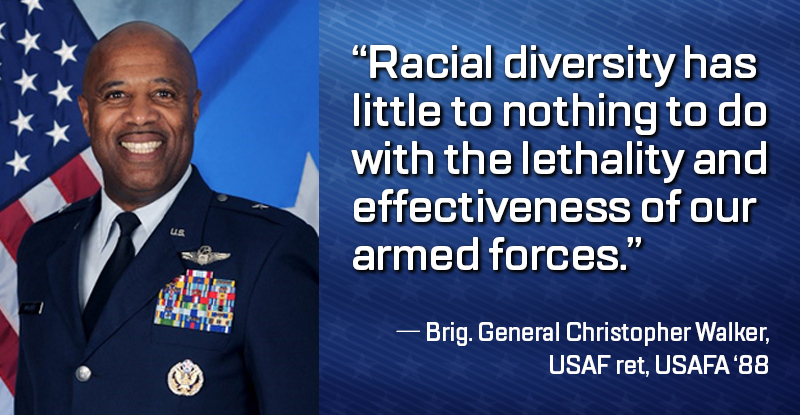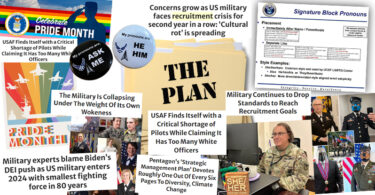By Ian Round | Maryland Daily Record
A retired Air Force general testified that racial diversity mattered “not one bit” to the military’s effectiveness on the first day of a trial challenging the U.S. Naval Academy’s admissions policies.
The first witness to testify in the case was retired Brig. Gen. Christopher Walker, who was called by the plaintiff, anti-affirmative action group Students For Fair Admissions.
“Racial diversity has little to nothing to do with the lethality and effectiveness of our armed forces,” said Walker, who is Black.
He said he was always the only Black person or one of the only ones during any assignment, but that it didn’t matter.
When he was stationed in Baghdad, for example, “I was concerned with who was a good driver and who was a good shooter.”
But an attorney for the Naval Academy argued that diversity in the military is critical to national security, and that Black and Hispanic Midshipmen remain underrepresented.
“Diversity is a strategic imperative,” said Joshua Gardner, a lawyer for the U.S. Department of Justice who is representing the Academy.
The bench trial, over which U.S. District Court Judge Richard Bennett is presiding, is scheduled to last two weeks but could spill into a third.
Toward the end of his career, Walker worked in the Air Force’s office of diversity and inclusion. There, he worked to get rid of height requirements that were an “unnecessary barrier” for many women.
Students For Fair Admissions sued the Naval Academy last year, shortly after it won two landmark Supreme Court cases that undid race-conscious admissions at Harvard and the University of North Carolina. The majority opinion stated that the decision did not apply to the military colleges, saying they may have “potentially distinct interests.”
Walker, who retired last year after 40 years in the Air Force and the West Virginia Air National Guard, did not speak to the Navy’s admissions policies; his testimony focused on diversity in the military more broadly.
He said diversity of opinion, socioeconomic background and skills are important, but that race shouldn’t be considered.
Racial diversity will “happen on its own” if other factors are considered instead, he argued.
In his opening statement, Adam Mortara, arguing on behalf of SFFA, said the academy’s use of race in admissions discriminates against white students.
He showed admissions data showing higher acceptance rates for Asian, Black and Hispanic students in the middle deciles of a holistic metric than white students in the same deciles. He also claimed many rejected white candidates had higher SAT scores than Black candidates who were admitted.
Whereas he argued that Harvard discriminated against Asian students, he said the Naval Academy has an “Asian preference,” leading to a higher proportion of Asians in the student body than in the American population.
He said the college’s race-conscious policy lacks logic and an “end point.”
“The military really loves to keep track of things,” said Mortara, a law professor at the University of Chicago who also tried SFFA’s case against Harvard. “However, the Naval Academy is not very good at keeping track of its use of race.”
Gardner said the admissions process is not “mechanistic,” and that race is just one thing the school looks at.
Gardner said the academy doesn’t have “quotas” or “points” for minority students, doesn’t use “racial balancing,” and doesn’t consider race in isolation. He noted that members of Congress nominate a large majority of the student body, and that they are more likely to nominate white students. The non-white student population has grown over the past 20 years, but Black and Hispanic students remain underrepresented, he said.
“Much of the applicant pool is completely outside of the control of the Naval Academy,” Gardner said. “Real progress is being made — we just aren’t there yet.”
He said a diverse academy and officer pool lead to better recruitment and retention, as well as more legitimacy both at home and abroad.
Regarding Mortara’s argument that a race-conscious policy must end when it achieves a certain goal, Gardner said, “no court has ever held that national security has an end date.”
First published in the Maryland Daily Record
“. . . lead to better recruitment and retention” ???
Evidence that the DEI/CRT agenda in the military DOES hurt recruiting and retention
And in other non-news, Reuters completely ignores the testimony of a black military general in their article on Monday’s trial: US Naval Academy defends race-conscious admissions policies at trial. What a headline, USNA defends being racist.
What People Are Saying
Some of the comments:
“As an ex submarine officer, I wanted the best qualified people on the crew. If one person failed to do a critical job properly, we could have all died together. Race has no place in any selection process.”
“My sons are both Marines. One is an Annapolis alumnus and the other was accepted but decided not to go. My son doesn’t wear his ring at all ever. I’m pretty sure if the worst should happen, Harris is elected, both will resign their commissions and get out.”
“I know a young man who graduated West Point. He wanted to make the military a career. He has since resigned his commission for this very reason. He is white and says the military has become way too WOKE.”
“I don’t know current policy as I retired from the AF in 1998, but while I was on active duty we were required to state at the end of every fitness report that “so & so supports the affirmative action program.” I never objected to this at first because I had no idea what it meant. By the time I made E-7 I learned about an AF regulation that covers affirmative action. It was short, only a few pages, but it laid down the rules for this program. It required that the test promotion scores for white males be lowered until they were below the level of cutoff that would capture enough “promotees” within the targeted race or sex. Discrimination 101.”
“I hope they are successful in their efforts. I’m a retired Naval Officer. Received my commission through NROTC. Son of a Naval officer which made me eligible for a presidential appointment in the early 70s. At the time I think there were 100 each year. I was 104th on the list of candidates even though I was at the top of the class academically, basketball team, student government, etc. Mother is Japanese, so part of an even smaller minority. I see these efforts over the years as favoring specific groups and not in the best interests of the service. Admissions should be solely on merit and aptitude.”
“My grandson graduated this year from USMA West Point. He said that some of the instructors were absolutely woke and probably thought that not mis-gendering the enemy was more important than war fighting skills.”
“Prediction: It will lead to under qualified people in the wrong places and a weaker organization… like it has 100% of the time it is tried anywhere else.”
“If you want to have the academies reflective of population composition of our country the answer is to have students prepare earlier in their education/life. To lower the standard just to get more of a certain race, gender, etc., is a slap in the face to those who toiled to be consider for admission.”
“Regardless of skin color or ethnicity, future military officers need to have sufficient intelligence, physical performance, character and integrity to do the job. We call it “merit” for short. The people of the United States deserve to be defended by the best. Everyone has an equal opportunity to strive to be the best, not a guarantee to get a place on the basis of DEI.”
“Where is merit? Where is the idea of passing tests and personal interviews? Where is competition to earn a place in the Academy or any other place you want to be? This ain’t my Navy! I have written that phrase too many times in the near past or recently with the many things I see that have left our Spit and Polished way of life. While being a Midshipman myself many moons ago, there was competition but also friendship between all of us and no mention of any kind of race preference was ever talked about or even thought of! By the way, there were no women Midshipmen in the middle fifties. I have seen all measures of people, women and men now in the ranks of the Naval Academy Midshipmen and never thought of any kind of DEI at all! Beat Army!”
“How about we seek the best and brightest without regard for bathrooms, preferences or heritage.”
“Once we pick the most qualified candidates not based on color, sex or religion, then we can begin to call ourselves a racist free country.”
“The sad part is that a large portion of the “DEI plebes” will wash out over the four years, since they’re not adequately prepared in some way or another. Saw this situation often, and the feeling that “other qualified applicants were cheated out of a spot/chance” is common. The ones who did make it through, even after five years, were good to go and many have done well in their military careers. In the long run however, the DEI scheme just doesn’t work in a vital organization such as the military.”
“If DEI is so great, why are people unhappy when they are called a DEI hire? Shouldn’t they feel honored?”
“It should be a strictly merit based selection process. People can more likely die when not choosing the best candidates.”
“My friend wants to know if the Chinese have race-based initiatives for their military leaders.”
“When you fight Racism with Racism the end result is Racism.”
“I remember when women were first admitted. Some had to be twice as good to get equal recognition. Some got twice the recognition for half the effort. Some got ahead by giving it. I definitely remember body fat on women being reclassified as “loose muscle” in order to avoid kicking them out for being, uh, basically, fat. The men didn’t get that consideration.”
“I was a PRT PO, I had women who couldn’t do one pull up, enough sit-ups or push ups, and forget the run. They somehow passed while men were forced to do remedial PT.”
“Choosing because of race or gender over skill, intelligence, competency = lower standards = downfall of academies. It’s also reverse racism.”
“The attorneys argue that “unlike civilian universities, USNA prepares students for war.” As a veteran, I would prefer that the officer leading me into battle got into the service academy because he was smarter than the other applicants. Not because he was black, Latino or some other preferred group. DEI has no place in the military.”
“USNA’s new cadets: 4 Native Americans, 70 African Americans, 132 Asian Americans, 178 Hispanic Americans and 642 Whites.” What, Whites are not Americans? Or you tell me you cannot say White American?”
“When I was in USN flight school in the mid-seventies, minority students received 5 points extra on exams. As a result, many unqualified minority students earned their “wings.” In the fleet, some NFOs refused to fly with some because of the risk. Many of these NFOs were then separated from service when it was reflected on their performance evals. It was a very dangerous practice to give an extra 5 exam points on the basis of race.”
“I am a combat veteran, also a woman. When I went into the Army then accepted to flight school, there was none of this crazy DEI “race” stuff. And thank God, because I would have never felt I truly earned it. And while in flight school I had the same requirements as the men to include physical. Yet, the Army was very diversified. A lot of that was thanks to Reagan. Take the best. In the academies you are also preparing for war. A bullet isn’t discriminating so to speak.”
“Ask any enlisted Navy or Marine personnel and they will quickly tell you it’s easy to identify officers who were given preferential treatment in their admission to the Academy.”
“Most candidates are unaffected by the consideration of race,” lawyers for the Naval Academy wrote in court filings. That’s a lie. Every candidate that is admitted and every candidate that isn’t admitted are affected by race in the selection process. Those that were admitted all know that someone was admitted because of race that wasn’t qualified and someone wasn’t admitted because of race whom was qualified.”
“I went to the Air Force Academy back in the early ‘90’s. I’m a white female. The first year that I applied, I was nominated but not appointed. I went to prep school for a year and got in the next year. I only recall one black guy in my basic training flight. I will never forget him. He was a disaster at everything. I’m far from perfect, but this dude couldn’t get anything right. Not a dang thing. And it brought all of us down as we tried to help him memorize his “knowledge” or even make his bed correctly. I have not a doubt in the world as to why he was there. And he left after basic training.”
“In 1963, I entered the Naval Academy as 1 of 4 non-white guys in the Class of ’67. I, an Asian, was proud that I earned my appointment competitively and would not have wanted otherwise.”
“Admission should be on merit and nothing else! Race based or DEI is a mistake that will get people killed in combat operations.”
“Navy has used racial/ gender preferential treatment in officer promotion boards for DECADES. The section board precepts mandate “X” number of females, blacks, Hispanics and Asians be selected for the rank being considered. It means other, more qualified applicants, will not always be chosen so they can diversify the Fleet ranks. Yet, they don’t call this racial discrimination? Go figure.”
“When my son applied to the Naval Academy early 90’s he was told “we need Hispanics from the Barrio…”. My son is blonde.”
“Without respect to a person’s race, I want the best, most competent, and intelligent people leading our armed forces. That is national security.”








Leave a Comment